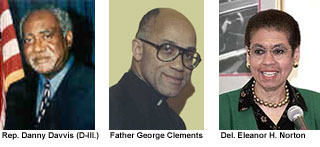
WASHINGTON (FinalCall.com) – National leaders, major organizations, grassroots representatives, scholars and policy makers led by Rep. Danny Davis (D-Ill.) will attempt to recapture the spirit of the Million Man March (MMM) Nov. 14-15, as they kick off a year-long dialogue on issues impacting Black men and their families.
The statistics are frightening: 32 percent of Black males are unemployed; 40 percent of them are involved in the criminal justice system; they are 6 percent of the national population, but 50 percent of the prison population; Black men and boys are concentrated on the low end of the literacy scale and are on the high end of the school drop-out scale; they are disproportionately dying earlier from diseases that are treatable.
“The Million Man March generated a lot of hope, a lot of activity,” Rep. Davis told reporters in a national conference call Oct. 16, the 8th anniversary of the March. “We think that was a magnificent day. As a matter of fact, I brought three busloads of individuals myself. We had a wonderful time.
“The follow-up in some places has been great. In some other places, the follow-up went flat. We plan to make sure there is much follow-up and much follow-through. We plan to build on the experiences of the MMM, so that we can capture and recapture some of the spirit that was generated at that time.”
The new follow-up organized by Rep. Davis will build on a two-year-old commission on Black men and boys convened in Washington, by the District of Columbia’s non-voting Congressional Delegate Eleanor Holmes Norton, and will include many of the leaders and activists who made the MMM possible.
Following initial November meetings in Washington, the conveners plan to organize at least four regional hearings around the country beginning in January, and to issue a full report on these revived efforts to support development among Black males in November 2004.
“The wonderful spirit (of Oct. 16, 1995, when 2 million men descended on the West Front of the U.S. Capitol for the MMM) can be recaptured as long as we all unite together and come together in a positive way to do research on this question, to have an action agenda to put forth, to work together and unite together,” said Father George Clements, founder of One Church One Family, and an award-winning former Chicago Catholic parish priest.
“The entire nation will benefit from this, because as long as you have a huge percentage of your population that is not productive, that means the entire nation is not being productive. We are grateful and humbled by the fact that so many of our African American males who have leadership positions are joining us in this dialogue,” Fr. Clements continued.
Rep. Davis plans for this new dialogue to explore the causes of hopelessness and to look to discover programmatic “best practices” to help boys become successful men. More than 150 participants have already registered for the upcoming November meetings.
One of the legislative proposals, The Public Safety Ex-Offenders Self Sufficiency Act, aims to convince all Americans that it is in the best interest of America to help individuals who are returning home from prison.
In some states, men returning from prison cannot find work in places where unskilled individuals might look first for job opportunities. In Illinois, Rep. Davis pointed out, there are 57 job titles that are against the law for them to hold. They can’t cut hair in barbershops, they can’t be beauticians, nail technicians, nor can they work in any health facility, they can’t wash dishes in a nursing home, they can’t cut grass at a daycare center.
Another critical issue is massive job loss in places where Blacks live, said Mr. Davis. In his Chicago Westside district, for example, there has been a loss of 140,000 jobs in the last two decades. “There are some communities where Black people live in America that look like Iraq.” Sadly, he continued, when new jobs are produced, 85 percent of them are located in suburban areas far from inner-city communities, and difficult to reach via public transportation.
Del. Norton agrees. The deterioration of the Black family is directly connected to the loss of decent paying manufacturing jobs beginning in the 1960s, she said in September at the time of a House Government and Reform Committee Hearing which examined the work of the D.C. Commission on Black Men and Boys which she launched in 2001.
“Not only do government programs need to be more sharply focused on boys and young men and on the revitalization of the African American family, it will take business, labor and community organizations, and especially parents and educators pulling together, to reverse the unprecedented problems that in turn have led to the downward spiral in Black family life with catastrophic effects on African American children,” Ms. Norton said.












